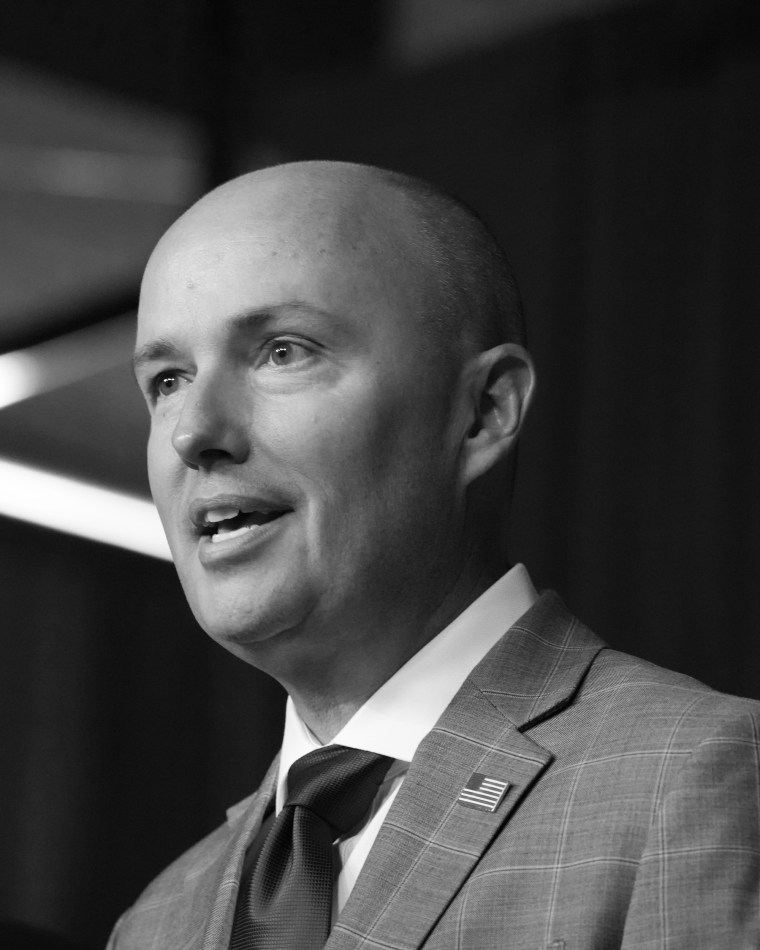A bipartisan odd couple takes on hefty problems: Division and loneliness

WASHINGTON — The Senate floor is typically the setting for speeches on foreign policy or spending battles or the occasional vote. But on a summer Thursday last year, Sen. Chris Murphy of Connecticut went to the floor to discuss a rarer topic for the room.
“I’m here to talk about loneliness,” Murphy said.
Murphy had been grappling with why Americans felt so divided at a time when technology has humans more connected than ever. His focus on the U.S. “epidemic of loneliness” led him down a path with many questions, few answers — and now, a Republican ally in the fight.
“How can we feel lonelier in a world where connection to other human beings now requires only a click of a button? How can we feel isolated when linkage to the outside world is delivered via nonstop handheld stimulus?” Murphy asked in a piece he wrote for The Bulwark in December 2022.
Those questions led Murphy to Utah Gov. Spencer Cox, a Republican who himself was trying to find solutions to reconnect the disconnected. The duo is currently holding roundtable discussions with experts and everyday Americans to understand the problems more deeply before plotting the solutions.
“I’ve been an admirer of the governor’s work for years,” Murphy shared in an interview with NBC News on Thursday, “especially when it comes to his work to try to draw our kids away from this culture of withdrawal that has been created by the smartphone technology and the apps that have become so addictive to our kids.”

Murphy said he reached out to Cox during a June phone call last year to “try to figure out why Utah is a place with really high social capital, with people who feel maybe a little bit more connected to the community than in other parts of the country and see if there was work that we could do together.”
Utah ranked as the happiest state last year, according to an annual study conducted by WalletHub. The 29 metrics tested are divided into three categories: emotional and physical well-being, work environment, and community environment. The U.S. ranked 23rd on the list of happiest countries in the world this year.
Cox has focused on signing legislation into law that would limit cellphone and social media use for children under 18. One bill enacted last year would require users to verify their age to access their social media accounts.
“The data really spoke to us that we were seeing happening in Utah, and what’s happening everywhere in the country and all over the world,” Cox said, seated next to Murphy outside of the Capitol complex. “This kind of hockey stick increases anxiety, depression and self-harm amongst our youth, especially young women.”
Facing legal challenges from a group that represents the social media companies Meta, TikTok and X, Cox recently approved a revision to the laws with language that could withstand scrutiny in court, but the overall premise remains.
“This is one area where the government, I think, can appropriately intervene,” Cox added, sharing that the “first thing” President Joe Biden wanted to discuss with him were Utah’s first-in-the-nation social media laws.
Outside of social media and its impact on children, Murphy and Cox have engaged with various specialists to discuss the economy, housing, gun violence, political polarization and the lack of spirituality among American communities that they said are all contributing factors to social isolation.
The issue has also caught the eye of the U.S. surgeon general, who prioritized a study and 85-page report on the loneliness epidemic that found loneliness and social isolation are mental hazards as dangerous as smoking up to 15 cigarettes per day.
Murphy has been involved in various bipartisan causes during his time in the Senate, including a gun safety law, the Safer Communities Act, in the wake of the Uvalde school shooting, and a border bill that was consigned to defeat by Republicans earlier this year. He is known for putting partisan politics aside in an effort to strike deals across the aisle. And he’s longing to make progress tackling this wide-reaching project.
“Our conversations in Washington nationally are important. And they’re relevant,” Murphy noted. “But they aren’t always connected to the things that actually make people happy.”
Federal and state governments can’t “deliver the last mile of happiness,” Murphy said, noting that determining what brings one purpose, meaning and fulfillment is up to the individual. But, Murphy continued, “We are in charge of trying to set rules and laws and norms that give people a better shot at happiness.”
The road to happiness and averting social isolation is a long one, even for the elected officials themselves.

During his childhood, Cox’s parents got divorced. He faced bullying and social isolation, with the other kids in his class even throwing him in a garbage can in the middle of the hallway.
“It was a really dark time and I went through a period of time where I thought the world would be a better place if I wasn’t in it,” admitted Cox, now a 48-year-old father of four.
He credits the family members, teachers and church leaders who lifted him up, “who saw something in me that I didn’t see in myself.” It was that experience, Cox said, that drove him to public service and now into his partnership with Murphy.
Murphy, who has served in the Senate for more than a decade, said he experiences social isolation for the same reason many Americans do. Murphy, a dad of two teenage boys, said parents could be among the loneliest in the country.
“Data tells us some of the loneliest people out there are parents, especially parents of young kids, who feel very alone right now amidst a world that seems to be crashing down on their kids,” he shared. “There’s no doubt that as a parent, I have often felt very alone.”
The changing landscape of social media and technology, the risk of violence at schools, and online bullying are among a suite of modern problems that are “unfamiliar” to older generations, Murphy said.
“I certainly come to this conversation as a parent who has often felt very, very isolated from the kind of solutions that I feel I need to help my kids thrive,” he said.







